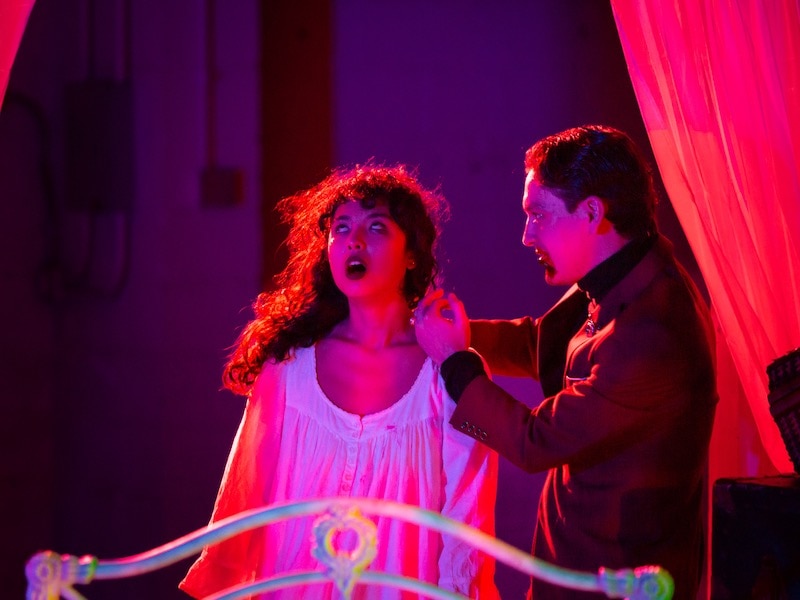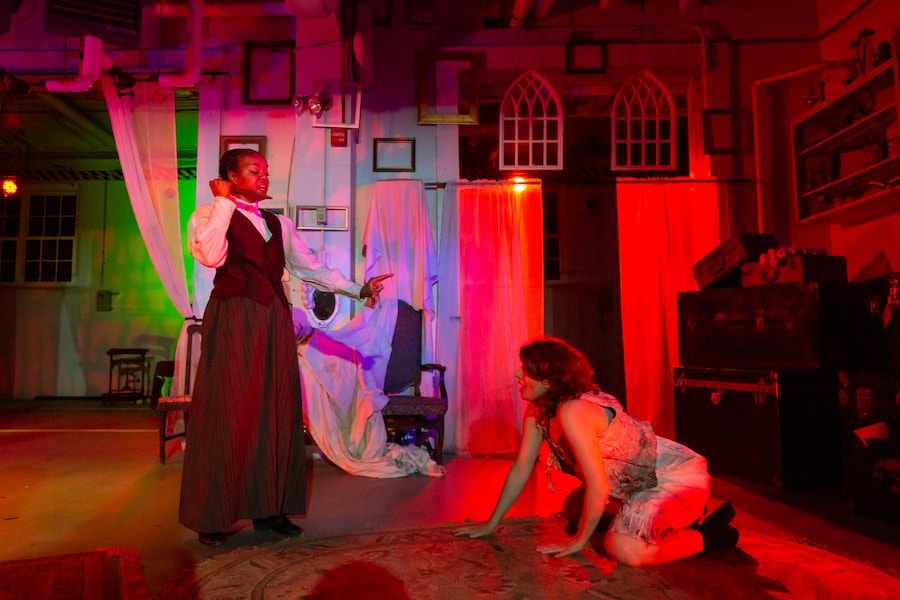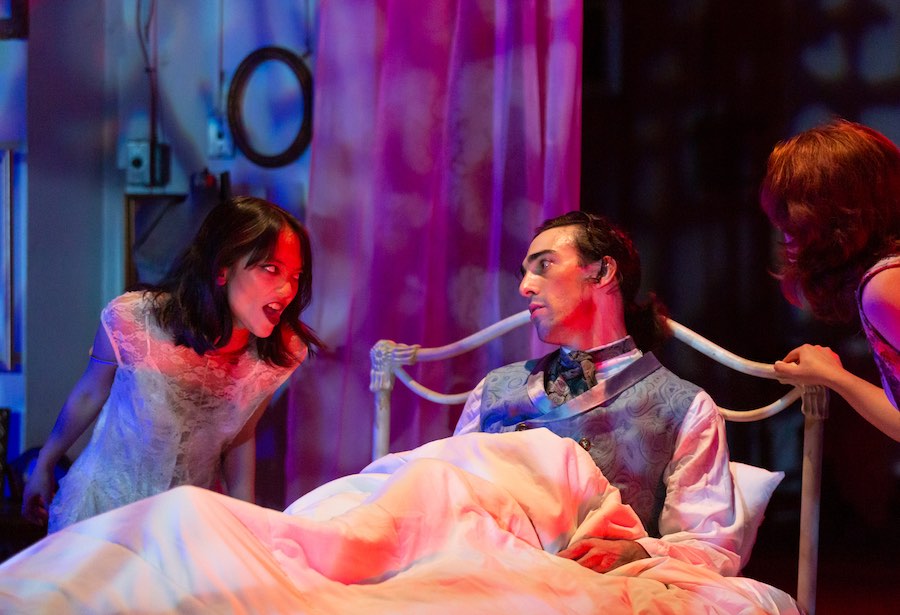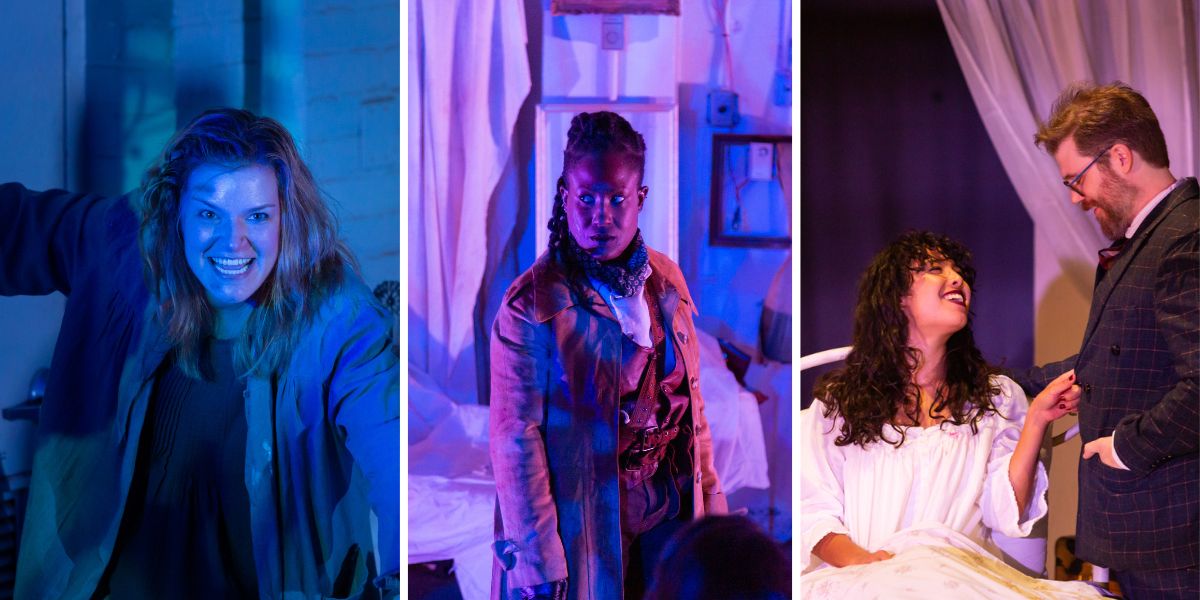Trust Rorschach Theatre to immerse us in an unreal world. Inevitably they go all in; it is their fantastical forte. And this time, with Kate Hammill’s feminist adaptation of Dracula in hand, Rorschach has conjured a wondrous world that becomes before our eyes a window into the real one.

The play’s unsubtle subtitle is A Feminist Revenge Fantasy, and the script bears an epigraph by the British poet Elisabeth Hewer:
God should have made girls lethal when he made monsters of men.
That blunt line may or may not be to your taste, but it points to the theme of a riveting production that will give you chills—because even more than a feminist revenge fantasy, this rendition of Dracula stabs at the heart of male authority in women’s lives.

The site of the performance is a disused firehouse, a station that once parked firetrucks and now houses a fire starter of a show. The set designed by Sarah Markley is an eerie assemblage of dust-cover-draped furniture, empty frames hung on walls among Victorian sconces, and gauzy scrims suspended in portals to a mysterious upstage otherworld. As the play shifts locales from London to Transylvania to a graveyard to an insane asylum and elsewhere, this multipurpose set together with spectral lighting by James Morrison and creepy sound by Kenny Neal propels the telling of the tale like a quickening heart. Neal’s dissonant inter-scene piano score would alone accompany any number of nightmares.
We hear first from Renfield, a madwoman locked in a London asylum (played with canny abandon by Christina Day). She prays to a father god as master even as she astutely warns the young, pregnant Mina (a winningly earnest Jessica Ludd) not to trust any men including her husband:
RENFIELD:
As long as they have power over us
They shall always abuse it!
…
They make all the rules—
And they don’t let you break them
And they try to break you if you try!
Once you belong to him—
He may dispose of you how he will
And you may scream and scream
And never be heard!
Mina lives in London with her husband, Jonathan (an impressively versatile Conor Patrick Donahue), who goes from staid solicitor to frantic vampire victim and then maybe back to normal. Renfield’s Cassandra-like words of warning will resonate throughout the play:
RENFIELD:
How can you truly tell—a good being from a bad?
How do you know if you are cherished or loved
—Or only tricked?
The titular vampire (played with charming urbanity, then vicious fury by Ben Topa) has summoned Jonathan to Transylvania to arrange a property purchase in London. In Dracula’s lair are two animal-like creatures, the household help: Drusilla (a brain-blank Marissa Liotta) and Marilla (a truly ghoulish Jolene Mafnas). The lurid goings-on there are spookily rendered in shadow and sound.

Back in London, we meet a betrothed couple, Lucy (a wonderfully guileless Bri Houtman) and Seward (Erik Harrison as a martinet under wraps). When Lucy falls seriously ill (due to Dracula), Seward summons Doctor Van Helsing for help. Van Helsing turns out to be a she, a cowboy-hatted vampire slayer, and in Phoenix Cross’s star-turn channeling of Flo Kennedy a real badass. The pro rivalry between Seward and Van Helsing is a spectator sport in itself.
Hamill has embedded several heady arguments in her retelling: Whether or not there are good men, whether vampirism (here a placeholder for toxic masculinity) is parasitical or the paramount of human evolution (i.e., can a man be cured or is it in his nature?), and whether women can fend for themselves against men bitten by power.

Early on there is a scene of sisterhood between Lucy, who is still single, and Mina, who is married. Their conversation underscores the play’s central interrogation: how can one be certain a good-seeming man is really good?
LUCY:
A man may be lovely during courtship, when they are trying to win you, and then turn. It happens—all the time.MINA:
Jonathan didn’t.LUCY:
You may have been fortunate, but I cannot help but be wary! …
without a husband, I have no standing, no prospects… But our whole destinies are wrapped up in men; once we are wed we are—little better than their chattel, according to the law, and I just—wish I could be absolutely sure of his character.
The plot, as is typical of supernatural stories, can get a bit labyrinthine—and this one includes a jaw-dropping chase-and-fight scene (skillfully choreographed by Casey Kaleba) that is head-scratchingly complex. But what keeps the show’s forward momentum feeling forceful and thoroughly absorbing is the emotional authenticity in each of the performances and the stunningly dextrous direction of Rebecca Rovezzi. Her brisk pacing and imaginative use of that already-strange space—in service of a script studded with high-stakes sexual politics—make for a thrilling experience in theatergoing.
Running Time: Two hours 30 minutes, including one intermission.
Dracula, a Feminist Revenge Fantasy, Really plays through November 6, 2022, presented by Rorschach Theatre performing at The Firehouse at the Parks at Walter Reed, located in the Parks at Historic Walter Reed in “Building 90” across the street from the Arts Park at 6810 Cameron Drive NW, Washington, DC). Purchase tickets online ($45 general admission, $30 for seniors and students, and a limited number of $10 tickets are available for every show).
The program for Dracula, a Feminist Revenge Fantasy, Really is online here.
COVID Safety: Masks are required to be worn by audience members.
Dracula, a Feminist Revenge Fantasy
By Kate Hamill, based loosely on the novel by Bram Stoker
Directed by Rebecca Rovezzi
Cast:
Van Helsing: Phoenix Cross
Renfield: Christina Day
Jonathan Harker: Conor Patrick Donahue
Seward: Erik Harrison
Lucy Westenra: Bri Houtman
Drusilla/Miller/Merchant: Marissa Liotta
Mina Harker: Jessica Ludd
Marilla/Maid: Jolene Mafnas
Dracula: Ben Topa
Understudies: Maryanne Henderson, Dannielle Hutchinson, Andrew Quilpa, Kaeli Patchen, & Daniel Riker
Creative and Production:
Set Design: Sarah Markley
Costume Design: Sydney Moore
Fight Choreography: Casey Kaleba
Intimacy Choreography: Megan Behm
Sound Design: Kenny Neal
Lighting Design: James Morrison
Props Design: Mercedes Blankenship
Vocal Coach: Jen Rabbitt Ring
Stage Management: Caraline Jeffrey (Season Stage Manager), Jen Katz (Assistant Stage Manager)
Production Manager and Technical Director: Adam B. Ferguson
Assistant Costume Design: Ashlynn Ludwig
Assistant Lighting Design and Master Electrician: Dean Leong
Additional Set Construction and Electrics: Sean Flaherty, Sydney Bronaugh
Box Office Manager: Michael Kyrioglu
House Manager: Kelsey Jenkins
Produced by Randy Baker and Jenny McConnell Frederick




